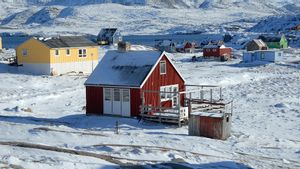JAKARTA - Europe is known as a difficult place to move for non-Europeans, who are trying to move and work there.
In fact, some countries have some of the world's strictest immigration rules, such as Liechtenstein and the Vatican.
However, countries across Europe are now facing a severe labor shortage, causing major disruptions in recent months. In fact, many countries are now making it easier for migrant workers to move to the European Union to work.
The following is a list of countries that make it easier for non-European citizens to get work visas, reported by Euronews on November 10.
Germany recently launched a new 'opportunity card' to attract skilled migrant workers. Using a point system, 'Chancenkarte' allows those looking for jobs in Germany to move to the country before getting jobs or internships, rather than having to apply from abroad.
Applicants must be under the age of 35, have adequate language skills to live in the country and at least three years of professional experience in their CV.
They also need to prove they are able to pay living expenses, as long as they are in Germany before getting a job.
Denmark is also in dire need of workers in all types of industries, looking professionals from other countries to step in and help.
Skilly workers are needed from areas such as science and engineering to legal and health care professionals, from IT teachers and specialists to electricity makers, iron experts and metal workers.
The full list of professionals needed is available on the Positive List for People with Higher Education and Positive Lists, for theamply Work published by the Danish International Recruitment and Integration Agency (SIRI). The list was introduced on July 1 and will remain in effect until December 31.
If you are offered a job in an industry that is included in the two lists, you can apply for a residence permit and Danish work permit.
Your stay permit will apply during your tenure, if you have a contract shorter than four years or four years if longer.
If you apply for a job on a list from abroad, you will be given a valid residence permit for one month before you start working, so you can stay in that country, provided you prove that you can defend yourself in that period.
According to statistics, there are currently 71,400 vacancies in the private sector in Denmark, with the highest number of job vacancies in the capital Copenhagen.
Getting a relatively easy work visa in Ireland, which offers a number of options ranging from short to long term.
Although it must have found a job before being able to apply, the country is actively looking for migrant workers to fill vacancies in sectors experiencing significant shortages.
The country has two main work visas, a Critical Skills Work Permit for high-achieving workers and a Public Works License.
The first covers professions that are considered important to grow the Irish economy, while the second covers all types of work.
After receiving this permit, it is relatively easy for people to apply for permanent residence permits in the country.
Ireland also offers holiday visas to citizens of Argentina, Australia, Canada, Chile, Hong Kong, Japan, New Zealand, South Korea, Taiwan, and the US between the ages of 18 and 30 or 35.
Under this visa, migrant workers can stay in the country for up to 12 months, with the exception of Canadians who can stay for a period of up to 24 months.
Portugal recently launched a short-term visa, for workers intending to stay in the country for just one season. Under the Portuguese Job Visa, you are allowed to stay and work in the country for a maximum period of nine months.
You are also allowed to work in more than one company, during which time for seasonal work.
Another long-term work visa will depend on your profession. The app is known to take several months before it is completed. However, once you get it, you are allowed to stay in Portugal for one to two years.
Those who have lived in Portugal for five years can apply for permanent residence, after which they no longer need to apply for a work visa.
Finland has launched a 14-day fast lane process to get highly skilled workers into the country, as well as their families.
Those who can benefit from this service are designated by the Finnish government as'specialists' and novice entrepreneurs.
After 90 days in the country, non-EU workers must apply for a residence permit.
Meanwhile, other countries in the European Union including Spain and Italy recently announced they are trying to open up more opportunities for non-EU workers, and will soon issue a list of vacancies they need to fill by migrant workers.
The English, Chinese, Japanese, Arabic, and French versions are automatically generated by the AI. So there may still be inaccuracies in translating, please always see Indonesian as our main language. (system supported by DigitalSiber.id)








